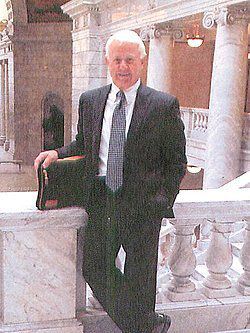A most interesting session, markedly different from the other sessions in which I have been privileged to participate. It was bold, sometimes almost brazen, and willing to tackle major issues on numerous fronts.
For years we have watched our rural highways suffer from inadequate maintenance. The Utah Department of Transportation has patched and chipped here and there while devoting most funds to major projects along the Wasatch Front. Shortly before midnight on the last day we came to an agreement that had three major components. First, we added a nickel to each gallon of fuel. This greatly helps the rural counties who lobbied hard for this result. Second we added a sales tax on fuel that will kick in if and when the wholesale price increases. It will track inflation and stabilize the fund. Finally we gave the green light for a local option sales tax of a quarter of a cent if adopted by county and city officials.
Rural Utah also received a major boost in public education funding. After years of discussing the great variance in land values throughout the state, we adopted an equalization formula that will spread education money to school districts wherever the students live. The plan received support from the “haves” as well as the “have-nots.” It’s a credit to statesmanship as opposed to provincialism. We coupled this boost with an increase in the “weighted pupil unit” of 4 percent. Other funding brings the number up from that. Lest anyone thinks this is overly generous, I point out that most of the dollars will go to cover increased insurance and other costs so it will be difficult to increase teacher compensation more than one percent.
A most remarkable and somewhat unexpected joinder in a common cause occurred when the LDS Church and the gay and transgender community supported legislation that protected the latter in matters of housing and employment, while at the same time protecting religious freedom. Hopefully, this will reduce ill will and allow us to focus less on the fight and more on respect for all human beings and the things they hold dear. In many ways, it is the reverse of prior fights in this arena.
We also adopted three significant bills relating to water rights which have been developing for several years, but never produced sufficient consensus to get through both houses. This year there was a greater effort to bring all voices to the table and profit from the collective wisdom and experience. It worked. As a result, the respective roles and responsibilities of the users and managers of water are clearer and the process better defined. It will protect all parties and the ever-increasing value of this irreplaceable resource.
Both legislative bodies and the Governors office worked long and hard to reach agreement on health care funding. Late in the week it became increasingly clear that it was not going to happen. We adopted a resolution to continue the negotiations uninterrupted with an end design of reaching an agreement and calling a special session to enact the necessary legislation. Last week I outlined the competing positions and will keep you posted as we attempt to arrive at the best result. One of the most far reaching products of this session is the adjustment to the criminal code, which focuses on alternatives to imprisonment for long terms. There will be an increased emphasis on treatment and programs to reduce the number of repeat offenders. I express appreciation for the great privilege of representing the citizenry in House District 70.
Legislative update by Rep. Kay McIff

"Rep. Kay McIff."
